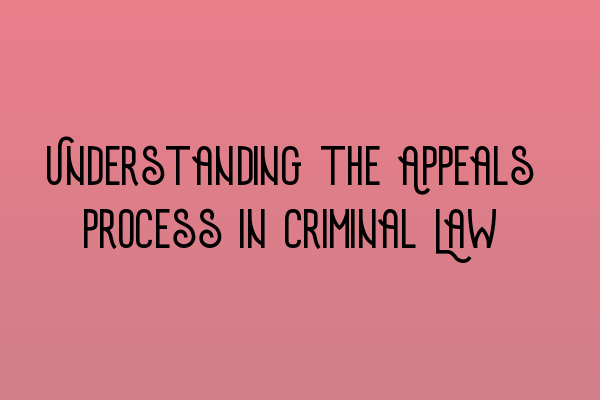Understanding the Appeals Process in Criminal Law
Introduction:
The criminal justice system plays a crucial role in maintaining law and order in society. However, like any human endeavor, it is not perfect and mistakes can be made. That’s where the appeals process comes into play. Understanding the appeals process in criminal law is vital in ensuring that justice is served and that individuals have the opportunity to challenge wrongful convictions or unfair sentences.
What is an Appeal?
At its core, an appeal is a legal proceeding that allows a convicted individual to challenge the ruling of a lower court. It is an opportunity for a higher court to review the decisions made by the lower court to ensure that proper legal procedures were followed and that the individual’s rights were upheld.
Grounds for Appeal:
There are several grounds for appeal in criminal law, including:
1. Errors in Law: One of the most common grounds for appeal is the claim that the lower court made an error in interpreting or applying the law. This could include misinterpretation of statutes, incorrect jury instructions, or the introduction of improperly obtained evidence.
2. Procedural Errors: Appeals can also be based on procedural errors, such as the violation of the defendant’s rights during trial. This could include issues like improper jury selection, denial of the right to counsel, or denial of the right to cross-examine witnesses.
3. New Evidence: In some cases, new evidence may come to light that was not available at the time of the original trial. This evidence could be crucial in proving the defendant’s innocence or raising doubts about their guilt.
The Appeals Process:
The appeals process typically involves the following steps:
1. Notice of Appeal: The first step in the appeals process is filing a notice of appeal with the appropriate court. This document notifies the court and the opposing party that the convicted individual wishes to appeal the ruling.
2. Record of Proceedings: Once the notice of appeal is filed, a record of proceedings from the lower court is compiled. This record includes transcripts of the trial, exhibits, and any other relevant documentation or evidence.
3. Appellate Briefs: Both the appellant (the individual appealing the ruling) and the appellee (the opposing party) have the opportunity to submit written arguments called appellate briefs. These briefs outline the legal arguments and support for their respective positions.
4. Oral Arguments: In some cases, the appellate court may schedule oral arguments where the attorneys for both sides present their cases in person. This allows the judges to ask questions and seek clarification on the legal issues at hand.
5. Appellate Decision: Following the submission of briefs and oral arguments, the appellate court will review the case and make a decision. The court may affirm the lower court’s ruling, reverse the ruling, or order a new trial.
Conclusion:
The appeals process in criminal law is a critical component of the justice system. It serves as a safeguard to protect the rights of individuals and ensure that justice is served. Understanding the appeals process can help those who have been wrongfully convicted or received unfair sentences seek the justice they deserve.
If you are interested in learning more about criminal law and preparing for the SQE exams, be sure to check out these related articles:
– SQE 1 Practice Exam Questions
– SQE 1 Practice Mocks FLK1 FLK2
– SQE 2 Preparation Courses
– SQE 1 Preparation Courses
– SRA SQE Exam Dates
These resources will provide you with valuable insights and guidance as you navigate the world of criminal law and prepare for your SQE exams.
